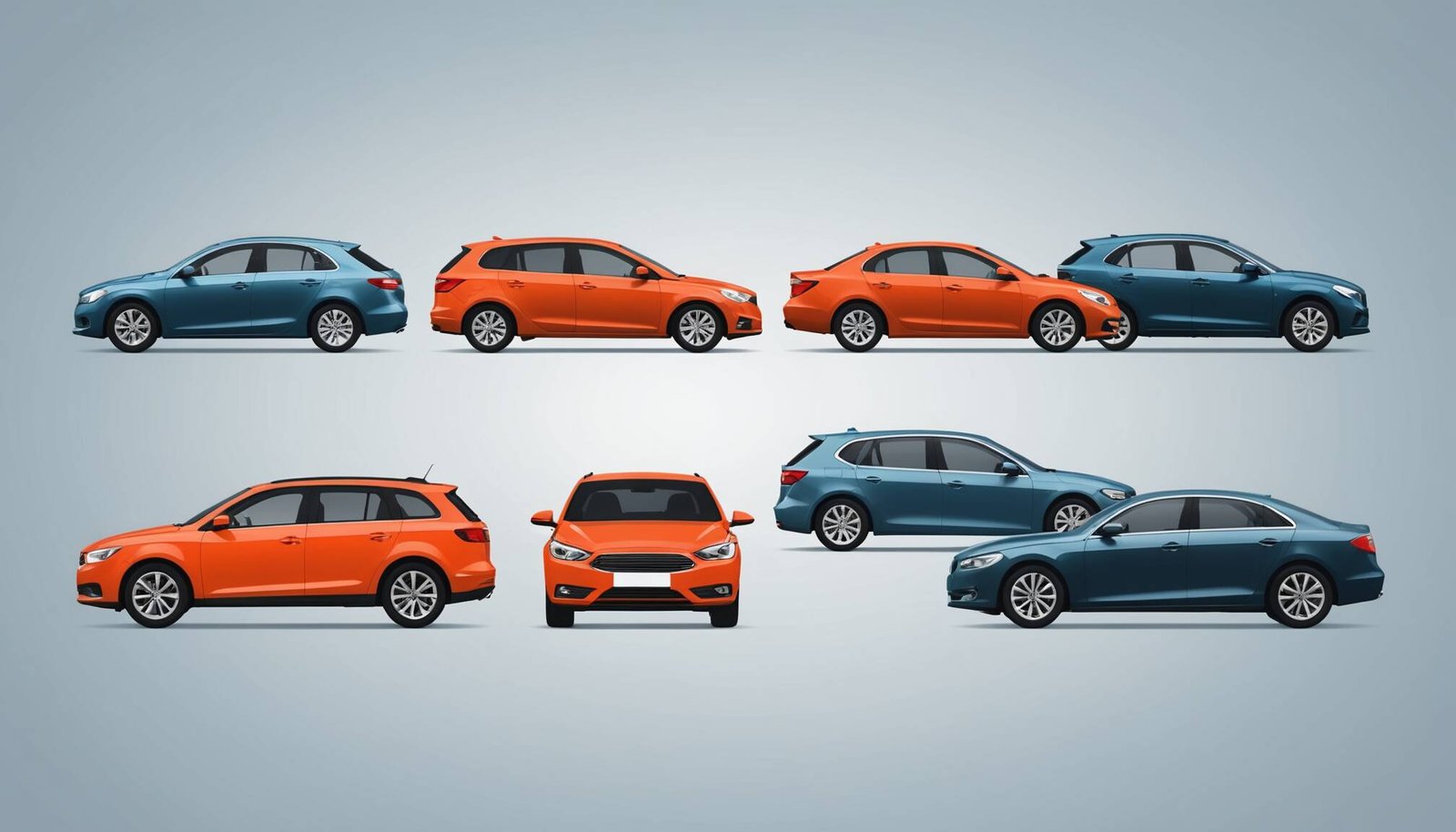Best budget family cars UK 2024-2025: top affordable models compared
Looking for a family car that won’t break the bank? We’ve analyzed the UK market to bring you a comprehensive comparison of the best budget-friendly family cars available in 2024-2025. Our guide focuses on models under £25,000 that offer the perfect balance of practicality, safety, and value for money.
Top affordable family cars under £25,000
Dacia Jogger
Starting at just £16,000, the Dacia Jogger stands out as the most affordable seven-seater in the UK market. This practical family car offers exceptional value with its spacious interior, comfortable ride, and impressive fuel efficiency. The Jogger comes with a range of modern features including:
- Seven-seat configuration with removable third row
- 700 litres of boot space
- Efficient turbocharged petrol engine
- Available hybrid powertrain option
- Modern infotainment system
Skoda Octavia
The Skoda Octavia continues to be a top choice for families seeking reliability and practicality. Starting from £22,000, it offers exceptional value with class-leading space and refined driving dynamics. Notable features include:
- 640 litres of boot space
- Advanced safety systems
- Frugal engine options including hybrid variants
- Premium-feeling interior quality
- Strong resale values
Ford Focus
The Ford Focus remains a popular choice among UK families, offering an engaging driving experience combined with practical features. While new models start at £24,000, pre-owned models offer excellent value. Key highlights include:
- 375 litres of boot space
- Excellent handling and ride comfort
- Range of efficient engines
- Advanced driver assistance features
- User-friendly infotainment system
Nissan Qashqai
The Nissan Qashqai combines SUV practicality with family-friendly features. Starting around £25,000, it offers excellent value in the crossover segment. Safety ratings are particularly impressive, with key features including:
- 430 litres of boot space
- Advanced safety technology
- Elevated driving position
- Efficient hybrid powertrains
- Strong build quality
Kia Ceed Sportswagon
The Kia Ceed Sportswagon offers exceptional practicality and value, backed by a market-leading 7-year warranty. Starting from £21,000, it provides remarkable reliability and owner satisfaction. Standout features include:
- 625 litres of boot space
- Comprehensive standard equipment
- Efficient engine lineup
- Premium interior quality
- Excellent warranty coverage
When comparing these models, consider your specific needs regarding space, fuel efficiency, and features. Each car offers unique advantages, making them suitable for different family requirements while maintaining affordability.
[Continued in next sections…]
Family car safety features and ratings guide
When it comes to choosing a family car, safety is paramount. Modern family vehicles come equipped with advanced safety technologies and undergo rigorous testing to ensure maximum protection for occupants. Let’s explore the key safety features and ratings of today’s most popular family cars.
Euro NCAP safety ratings explained
The European New Car Assessment Programme (Euro NCAP) provides standardized safety ratings that have become the benchmark for vehicle safety in the UK. Their comprehensive testing evaluates four key areas:
- Adult Occupant Protection
- Child Occupant Protection
- Pedestrian Protection
- Safety Assist Technologies
Top safety performers
Several affordable family cars have achieved exceptional safety ratings in recent tests. The Skoda Superb stands out with impressive scores of 93% for adult occupant protection and 87% for child occupant protection. Similarly, the Nissan Qashqai has earned outstanding ratings with 91% scores in both adult and child protection categories.
Essential safety features
Modern family cars come equipped with various advanced safety technologies:
- Automatic Emergency Braking (AEB)
- Lane Departure Warning
- Blind Spot Detection
- ISOFIX Child Seat Mounting Points
- Electronic Stability Control
- Multiple Airbag Systems
Advanced driver assistance systems
Many affordable family cars now feature sophisticated driver assistance technologies that were previously only available in luxury vehicles. The Volkswagen Passat, for instance, includes automatic emergency braking and lane-keeping assistance as standard, while the Renault Megane E-Tech offers adaptive cruise control and advanced collision prevention systems.
Visibility and lighting
Good visibility is crucial for safe family driving. Modern family cars increasingly feature:
- Adaptive LED headlights
- 360-degree parking cameras
- Rear parking sensors
- High-performance daytime running lights
- Large windscreens and windows for optimal visibility
Child-specific safety features
Family cars must prioritize child safety. Key features to look for include:
- Multiple ISOFIX mounting points
- Child-safe door locks
- Power window lockout
- Rear seat reminder systems
- Impact protection specifically designed for child passengers
These safety features and ratings should be carefully considered alongside other factors like price and practicality when choosing a family car. Remember that while all new cars must meet minimum safety standards, some models go above and beyond to provide exceptional protection for families.
Running costs and fuel economy comparison
When evaluating family cars, understanding the total running costs and fuel economy is crucial for making an informed decision. Let’s break down the key financial aspects of owning a family car in the UK in 2025.
Fuel efficiency leaders
Among affordable family cars, plug-in hybrid vehicles (PHEVs) demonstrate the most impressive fuel economy figures. Modern family PHEVs can achieve remarkable efficiency, with several standout models leading the pack:
- Skoda Octavia Estate PHEV – Up to 282.4 mpg
- Toyota RAV4 PHEV – Achieves 270+ mpg in optimal conditions
- Peugeot 308 PHEV – Returns up to 275 mpg
For conventional petrol and diesel options, several models offer excellent fuel economy without the premium price tag of hybrid technology. The Dacia Jogger stands out with its efficient turbocharged petrol engine, delivering impressive real-world economy while maintaining affordable running costs.
Annual running costs breakdown
The average annual running costs for a family car in the UK typically include:
- Fuel costs: Approximately £1,400 per year
- Insurance: Average of £561 annually
- Maintenance and repairs: Around £300 yearly
- Road tax: Varies by vehicle emissions
- Total annual running costs: Approximately £3,500
Maintenance considerations
Different models vary significantly in their maintenance requirements and costs. The Skoda Octavia and Ford Focus are particularly noted for their reasonable maintenance expenses and reliable performance. Modern family cars typically require regular servicing every 12,000 miles or annually, whichever comes first.
Depreciation factors
Depreciation represents one of the largest long-term costs of car ownership, with the average annual depreciation cost in the UK around £1,104. Some models retain their value better than others:
- Dacia models: Known for strong value retention
- Toyota RAV4: Excellent residual values due to reliability reputation
- Skoda Octavia: Consistent performer in the resale market
When considering total ownership costs, it’s essential to factor in both immediate running costs and long-term value retention. While some models might have higher initial purchase prices, their superior fuel economy and stronger residual values could make them more cost-effective over time. The true cost of ownership extends beyond the purchase price, making it crucial to consider all financial aspects before making a decision.
Most reliable family cars: owner reviews
When it comes to reliability and real-world performance, nothing beats actual owner experiences. Let’s examine what UK drivers have to say about the most dependable family cars based on comprehensive owner reviews and reliability surveys.
Honda Civic: The reliability champion
The Honda Civic stands out as one of the most reliable family cars, with an impressively low claim rate of just 7.54% according to recent UK reliability data. Owners consistently praise its:
- Exceptional build quality and durability
- Powerful yet efficient hybrid powertrain delivering 181bhp
- Low maintenance requirements
- Engaging driving experience
While some owners report occasional issues with ABS sensors and air conditioning condensers, these problems are relatively rare and typically inexpensive to fix. The latest What Car? Reliability Survey places the Civic among the top performers in its class.
Skoda Octavia: The practical choice
The Skoda Octavia receives overwhelming positive feedback from UK families, particularly regarding its:
- Outstanding practicality and generous boot space
- Refined and comfortable ride quality
- Impressive fuel efficiency, with diesel models achieving over 60mpg
- Comprehensive standard equipment
Long-term owners report minimal issues, with the current generation maintaining Skoda’s reputation for reliability. The Octavia’s sensible design and proven mechanicals contribute to its dependable nature.
Dacia Jogger: Value champion
As a newer entry in the family car segment, the Dacia Jogger has impressed owners with its:
- Exceptional value proposition as a seven-seater
- Practical interior configuration
- Efficient hybrid powertrain returning up to 59mpg
- Surprisingly good build quality for its price point
Some owners note that the hybrid drivetrain can feel slightly unrefined, but this is generally outweighed by the car’s outstanding practicality and value.
Toyota RAV4: Hybrid reliability
The Toyota RAV4 continues to earn praise from UK families for its:
- Bulletproof reliability record
- Efficient hybrid powertrains
- Spacious and well-built interior
- Strong resale values
Owner reviews consistently highlight the RAV4’s dependability, with minimal reported issues and excellent dealer support when needed. The hybrid system, in particular, receives high marks for its smooth operation and real-world efficiency.
Kia Ceed: Warranty winner
With a remarkable 94.6% reliability score, the Kia Ceed impresses owners with its:
- Industry-leading 7-year warranty
- Robust build quality
- Spacious interior and practical boot
- Low running costs
Owner feedback suggests that when issues do arise, they’re typically minor and well-handled by Kia’s dealer network. The comprehensive warranty provides additional peace of mind for long-term ownership.
[Continued in the next section…]
How to choose the right family car: Buyer’s guide
Selecting the perfect family car requires careful consideration of several key factors. Here’s a comprehensive guide to help you make an informed decision when choosing your next family vehicle.
Space and practicality requirements
First, assess your family’s specific space needs:
- Number of passengers regularly traveling
- Boot space requirements for school runs, shopping, and family trips
- ISOFIX points for child seats
- Flexible seating arrangements
- Easy access for loading children and cargo
Budget considerations
When determining your budget, factor in both purchase and ownership costs:
- Initial purchase price or monthly payments
- Insurance costs and tax bands
- Fuel efficiency and running costs
- Maintenance and service expenses
- Potential resale value
Safety features
Safety should be a top priority when choosing a family car. Look for vehicles with high Euro NCAP safety ratings and essential safety features such as:
- Automatic emergency braking
- Lane departure warning
- Blind spot monitoring
- Multiple airbags
- Electronic stability control
- ISOFIX child seat mounting points
Reliability and warranty
Research reliability ratings and warranty coverage. Consider manufacturers like Kia and Toyota that offer extended warranties and have strong reliability records. Check reliability surveys and owner reviews to gauge long-term dependability.
Fuel type selection
Choose the right fuel type based on your driving habits:
- Petrol: Ideal for lower mileage and urban driving
- Diesel: Better for high mileage and motorway driving
- Hybrid: Good for mixed driving and lower running costs
- PHEV: Excellent for short commutes with charging access
Test drive considerations
When test driving potential family cars, evaluate:
- Ease of parking and maneuverability
- Visibility from all angles
- Comfort for all passengers
- Road noise and ride quality
- Boot accessibility and loading height
- Child seat installation process
Remember to compare multiple models within your budget and consider both new and nearly-new options to find the best value for your family’s needs.
[FAQ section to follow…]

